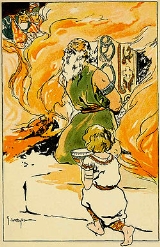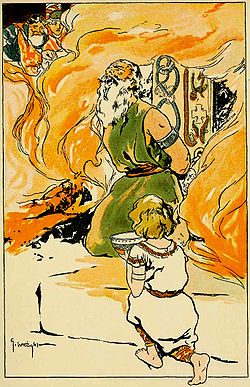
Grímnismál
Encyclopedia
Grímnismál is one of the mythological
poems of the Poetic Edda
. It is preserved in the Codex Regius
manuscript and the AM 748 I 4to
fragment. It is spoken through the voice of Grímnir, one of the many guises of the god Odin
, who is (through an error) tortured by King Geirröth. This was to prove a fatal mistake since Odin caused him to fall upon his own sword.
The work starts out with a lengthy prose section describing the circumstances leading up to Grímnir's monologue
, which comprises 54 stanzas of poetic verse. The last bit of the poem is also prose, a brief description of Geirröth's demise, his son's ascension, and Odin's disappearance. The prose sections were most likely not part of the original oral versions of Grímnismál.
 The narrative commences at a point when Odin
The narrative commences at a point when Odin
and his wife, Frigg
, were sitting in Hlidskjalf
, looking out on the worlds. They turned their eyes towards King Geirröth, who was reigning in the stead of his late father, King Hrauthung. Geirröth and his older brother Agnarr had been raised by Odin and Frigg, respectively. The god and goddess disguised themselves as a peasant and his wife, and taught the children wisdom. Geirröth returned to his father's kingdom where he became king upon his father's death, while Agnarr dwelt in company with a giantess in a cave.
In Hliðskjálf, Odin remarked to Frigg that his foster-child Geirröth seemed to be prospering more so than her Agnarr. Frigg retorted that Geirröth was so parsimonious and inhospitable that he would torture his guests if he thought there were too many of them. Odin disputed this, and the couple entered into a wager in this respect. Frigg then sent her maid Fulla
to Geirröth, advising him that a magician would soon enter his court to bewitch him, and saying that he could be recognised by the fact that no dog was fierce enough to leap up at him.
Geirröth heeded Fulla's false warning. He ordered his men to capture the man the dogs wouldn't attack, which they did. Odin-as-Grímnir, dressed in a dark blue cloak, allowed himself to be captured. He stated that his name was Grímnir, but he would say nothing further of himself.
Geirröth then had him tortured to force him to speak, putting him between two fires for eight nights. After this time, Geirröth's son, Agnarr, named after his brother, came to Grímnir and gave him a full horn from which to drink, saying that his father, the king, was not right to torture him.
Grímnir then spoke, saying that he had suffered eight days and nights, without succour from any save Agnarr, Geirröth's son, whom Grímnir prophesied would be Lord of the Goths. He then revealed himself for who he was, as the Highest One, promising Agnarr reward for the drink which he brought him.
In the body of the poem, Odin describes at great length the cosmogony
of the worlds, the dwelling places of its inhabitants, and talks about himself and his many guises.
Eventually, Grímnir turns to Geirröth and promises him misfortune, revealing his true identity. Geirröth then realized the magnitude of his mistake. Having learned that he is undone, he rose quickly to pull Odin from the fire, but the sword which he had lain upon his knee slipped, fell hilt down, the king stumbled and impaled himself upon it. Odin then vanished, and Agnarr, his son, ruled in his stead.
Norse mythology
Norse mythology, a subset of Germanic mythology, is the overall term for the myths, legends and beliefs about supernatural beings of Norse pagans. It flourished prior to the Christianization of Scandinavia, during the Early Middle Ages, and passed into Nordic folklore, with some aspects surviving...
poems of the Poetic Edda
Poetic Edda
The Poetic Edda is a collection of Old Norse poems primarily preserved in the Icelandic mediaeval manuscript Codex Regius. Along with Snorri Sturluson's Prose Edda, the Poetic Edda is the most important extant source on Norse mythology and Germanic heroic legends, and from the early 19th century...
. It is preserved in the Codex Regius
Codex Regius
Cōdex Rēgius is an Icelandic manuscript in which the Poetic Edda is preserved. It is made up of 45 vellum leaves, thought to have been written in the 1270s. It originally contained a further 8 leaves, which are now missing...
manuscript and the AM 748 I 4to
AM 748 I 4to
AM 748 I 4to is an Icelandic vellum manuscript fragment containing several Eddaic poems. It dates to the beginning of the 14th century. The six sheets which have been preserved contain the following poems, all mythological.*Grímnismál...
fragment. It is spoken through the voice of Grímnir, one of the many guises of the god Odin
Odin
Odin is a major god in Norse mythology and the ruler of Asgard. Homologous with the Anglo-Saxon "Wōden" and the Old High German "Wotan", the name is descended from Proto-Germanic "*Wodanaz" or "*Wōđanaz"....
, who is (through an error) tortured by King Geirröth. This was to prove a fatal mistake since Odin caused him to fall upon his own sword.
The work starts out with a lengthy prose section describing the circumstances leading up to Grímnir's monologue
Monologue
In theatre, a monologue is a speech presented by a single character, most often to express their thoughts aloud, though sometimes also to directly address another character or the audience. Monologues are common across the range of dramatic media...
, which comprises 54 stanzas of poetic verse. The last bit of the poem is also prose, a brief description of Geirröth's demise, his son's ascension, and Odin's disappearance. The prose sections were most likely not part of the original oral versions of Grímnismál.
Synopsis

Odin
Odin is a major god in Norse mythology and the ruler of Asgard. Homologous with the Anglo-Saxon "Wōden" and the Old High German "Wotan", the name is descended from Proto-Germanic "*Wodanaz" or "*Wōđanaz"....
and his wife, Frigg
Frigg
Frigg is a major goddess in Norse paganism, a subset of Germanic paganism. She is said to be the wife of Odin, and is the "foremost among the goddesses" and the queen of Asgard. Frigg appears primarily in Norse mythological stories as a wife and a mother. She is also described as having the power...
, were sitting in Hlidskjalf
Hlidskjalf
In Norse mythology, Hliðskjálf is the high seat of Odin allowing him to see into all realms.-Poetic Edda:In Grímnismál, Odin and Frigg are both sitting in Hliðskjálf when they see their foster sons Agnarr and Geirröðr, one living in a cave with a giantess and the other a king...
, looking out on the worlds. They turned their eyes towards King Geirröth, who was reigning in the stead of his late father, King Hrauthung. Geirröth and his older brother Agnarr had been raised by Odin and Frigg, respectively. The god and goddess disguised themselves as a peasant and his wife, and taught the children wisdom. Geirröth returned to his father's kingdom where he became king upon his father's death, while Agnarr dwelt in company with a giantess in a cave.
In Hliðskjálf, Odin remarked to Frigg that his foster-child Geirröth seemed to be prospering more so than her Agnarr. Frigg retorted that Geirröth was so parsimonious and inhospitable that he would torture his guests if he thought there were too many of them. Odin disputed this, and the couple entered into a wager in this respect. Frigg then sent her maid Fulla
Fulla
In Germanic mythology, Fulla or Volla is a goddess. In Norse mythology, Fulla is described as wearing a golden snood and as tending to the ashen box and the footwear owned by the goddess Frigg, and, in addition, Frigg confides in Fulla her secrets...
to Geirröth, advising him that a magician would soon enter his court to bewitch him, and saying that he could be recognised by the fact that no dog was fierce enough to leap up at him.
Geirröth heeded Fulla's false warning. He ordered his men to capture the man the dogs wouldn't attack, which they did. Odin-as-Grímnir, dressed in a dark blue cloak, allowed himself to be captured. He stated that his name was Grímnir, but he would say nothing further of himself.
Geirröth then had him tortured to force him to speak, putting him between two fires for eight nights. After this time, Geirröth's son, Agnarr, named after his brother, came to Grímnir and gave him a full horn from which to drink, saying that his father, the king, was not right to torture him.
Grímnir then spoke, saying that he had suffered eight days and nights, without succour from any save Agnarr, Geirröth's son, whom Grímnir prophesied would be Lord of the Goths. He then revealed himself for who he was, as the Highest One, promising Agnarr reward for the drink which he brought him.
In the body of the poem, Odin describes at great length the cosmogony
Cosmogony
Cosmogony, or cosmogeny, is any scientific theory concerning the coming into existence or origin of the universe, or about how reality came to be. The word comes from the Greek κοσμογονία , from κόσμος "cosmos, the world", and the root of γίνομαι / γέγονα "to be born, come about"...
of the worlds, the dwelling places of its inhabitants, and talks about himself and his many guises.
Eventually, Grímnir turns to Geirröth and promises him misfortune, revealing his true identity. Geirröth then realized the magnitude of his mistake. Having learned that he is undone, he rose quickly to pull Odin from the fire, but the sword which he had lain upon his knee slipped, fell hilt down, the king stumbled and impaled himself upon it. Odin then vanished, and Agnarr, his son, ruled in his stead.
External links
- Grímnismál in old Norse and Henry Adams BellowsHenry Adams BellowsHenry Adams Bellows was a lawyer, state legislator, and jurist born in Rockingham, Vermont. He was elected to the New Hampshire House of Representatives from Littleton, New Hampshire in 1839. He was subsequently elected again to the House from Concord, New Hampshire in 1856–1857, and served as...
' translation, at voluspa.org

